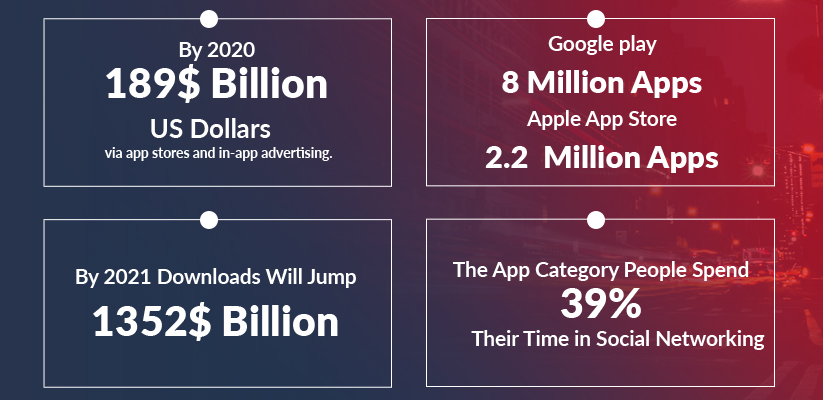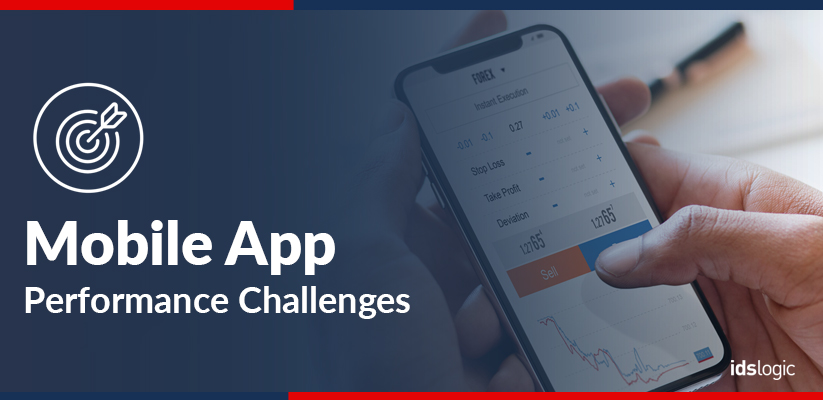
Mobile App Development: Challenges That Startups Face and How to Resolve Them
If you are a business owner and have closely analyzed the digital market in past one year, then you have surely observed a paradigm shift that has occurred from desktop application to mobile apps.
So, it is no more a secret that mobile usage has drastically increased in the past few years and this has ultimately contributed to digital transformation.
Today, mobile app development has become the game of survival and the ones that deliver great results are here to stay.
Since the digital market is quite volatile, and new technologies are frequently invented, it is crucial for business organizations to invest in latest tech trends and deliver richer and faster mobile experiences to the users.
Mobile Statistics and Usage Report:
1- By 2020 mobile applications are forecast to generate about 189 billion US dollars via app stores and in-app advertising.
2- Google play store has about 8 million apps and 2.2 million in the Apple App Store, 600K in the Amazon App Store.
3- 39% of the app category people spend their time in social networking, while gaming and messaging apps come second with 10%
4- According to a survey, by 2021 total mobile app downloads will jump to a stunning 352 billion and all major smartphone and tablet manufacturers will have to update their hardware and come up with new features and apps to meet user needs.

Whether you have a brick and mortar store or a website, mobile app users have established great expectations that you need to meet or you may just find yourself with a negative app review.
The process of developing a mobile application and bringing it to the market has various challenges and to be successful, it is very important to overcome these challenges and identify and resolve any performance issues.
Mobile App Performance Challenges
How many mobile applications have you stopped using because of excessive time to start up?
This excessive time needed to start an app may be due to various reasons and a variety of new performance concerns that mobile apps introduce. Now the thing is that, you need to be aware of these:

Mobile Devices: The first and the most frequently forgotten factor has been the mobile device itself.
Depending on the version of the application or the software platform used to create the app, it is important to create a list of devices on which the application can be installed and will offer optimum performance.
This will help to determine the user interface and how specific software layers will operate and also learn about the efficiency related inconveniences for the ultimate users.
Networking: Another most important point that should be considered is the network in particular.
The performance depends on when and how often the application uses the internet connection. Errors that often occur directly and affect the performance result from asking the server for data or a bad structure for storing the data in the cache.
The best solution is to plan to generate data well, so that the time taken is less.
Use of Libraries or Third Parties: Mobile app developers often dealing with large projects get involved with libraries that are not updated on an ongoing basis.
They help the developers in their development process and often provide functionalities that would involve a lot of time if written from scratch.
But one thing that needs to be remembered is that any outdated modules or codes may lead to performance issues and result in occurrences of breakdowns.
Therefore, mobile app development companies catering to their users in India, UK, US, Canada should build an application with the user experience as the main focus.
All the network call and other complex computations should be performed in the background thread and in case the users wait for a server response, a display of a busy indicator should inform the user that the mobile app is working.
The Startup Time can be Gauged in Three Ways and They Include
1- First screen: This is the time taken to show the users of the app something on their device screen.
2- Usable: This is the time that the mobile app takes to become interactive and usable.
3- Fully functional: This is the time when the mobile app has loaded all its resources and is fully functional.
Understanding PWA and AMP
Two technologies that are designed to deliver faster mobile experience to the visitors are Progressive mobile apps and Accelerated Mobile Pages:
Both PWA and AMP have generated marvelous results in terms of user experience. But how did these technologies come into the forefront?
The web users have drastically shifted towards mobile and so the focus was to offer them a remarkable mobile experience. But mobile app development poses its own challenges in the form of high latency and low attention window, crumbling networks, too much memory usage and etc.
Users had two options before them, either to browse the site through mobile or download their mobile app. Websites that took a long time to load often annoyed the mobile users, which finally led to higher bounce rates.
Accelerated Mobile Page
AMP is a feature that is created on the open source platforms and is approved by Google. It allows websites to load the content fast on mobile, offering a great browsing experience on any handheld devices.
AMPs are mostly used by News websites or by ecommerce sites. But the only negative aspect about it is that all the inappropriate JavaScript and codes are stripped off to save the bandwidth and to display the content.
The pages are sized by excluding the heavy elements that include images and this results in reduced page load time. However, at times removal of irrelevant scripts affects the user experience and may lead to low user engagement thereby reducing the conversion rate.
AMP takes ten times lesser data when compared to a usual site and page load time reduces to less than a second, thereby making the website four times faster.
Also Read: Need to Engage More Users for Your Mobile App? Here Is What You Should Do
Progressive Web Apps for Mobile Applications:
These are website pages and web apps that are a blend of traditional browser experience and mobile app experience.
They are web based applications that cater to the users on a mobile device or a laptop or a tablet. The app behaves more like a traditional website whereas mobile users would like its app like experience.
PWAs reduce the loading time of the web pages and makes it easy for the mobile users to sign in speedily.
It eliminates the checkout forms, fills the credit card information and etc. and the users only have to enter the CVV number. This makes the transactions seamless and secure.
Also Read: Essential Features That Your Mobile Application Should Have
What to Choose? AMP or PWA for Your Mobile App?
Both AMP and PWA are different and have their own pros and cons. So, it is very important to understand both these platforms thoroughly so that they can perform their best in combination.
If you are an HTTPs website owner, then you should have support for both these technologies as that will help to serve your website visitors letter.
In case of AMP, the users can easily access the content, whereas with PWA, the user engagement and user experience can be enhanced. So, if you are a mobile app developer, then both these latest features should be added to your app development strategy.
Once you have worked on your mobile app strategy, it’s time to work on the strategies to reduce the app development cost for startup business owners:
Most startups planning to create a mobile app often ask “How to reduce the app development cost?”
Though you cannot reduce the cost by about 50%, but there are some important ways that can help to make your app development affordable.
Minimum viable Product: MVP is usually built with fewer features and so it requires less cost than the original product. MVP can be built and released fast without wasting time and money. Once it Is released and starts to generate profits, you can work with the original product.
Using readymade templates: Choosing some readymade templates will help you to cut down the mobile app development cost. You may find many online templates for use that would fit your business needs and using such templates helps to reduce both time and money.
UI/UX simplicity: Another most important strategy to reduce the cost is to go for simple designs. A simple UI design is important and it is often easy to use. Most websites and apps opt for minimalistic design that is cheap and doesn’t add unnecessary costs to the development process.
Mobile specific features: All mobile devices have some specific features like call options, GPS, camera and etc.
Using these features in the app is a great idea, but not every device has the same features and adding all such features will of course increase the cost. So choose the features carefully so that your cost remains low.
Final Takeaway:
Most of the time business owners hurry to finish their projects without doing proper research or understanding everything thoroughly. Unless you are working with an expert team, you cannot rush with the process as this will lead to mistakes and add up extra cost to the development process.
Hiring a reliable app development company in India having expertise in varied platforms is a great option to save both on cost and time.
Contributed By:
Lopamudra Guha